TMGT402 - IHRM Practices: Foreign Assignments in Coca-Cola & Pepsi
VerifiedAdded on 2023/04/21
|19
|4353
|231
Essay
AI Summary
This essay analyzes the association between International Human Resource Management (IHRM) practices and the successful completion of foreign assignments by expatriates, focusing on Coca-Cola and PepsiCo. It examines various aspects of IHRM, including staffing policies (Ethnocentric, Polycentric, and Geocentric), recruitment, training, and the challenges faced by expatriates such as demoralization, family issues, and cultural differences. The essay compares the HR practices of Coca-Cola and PepsiCo, highlighting differences in recruitment strategies, training programs, and support for expatriates. It also explores the reasons for expatriate failure and suggests measures to minimize it. The analysis concludes that PepsiCo has been more successful in supporting expatriates, reflected in its higher revenues and return on assets compared to Coca-Cola. The essay emphasizes the importance of adapting HR practices to make expatriates feel at home through training, social involvement, and language support.
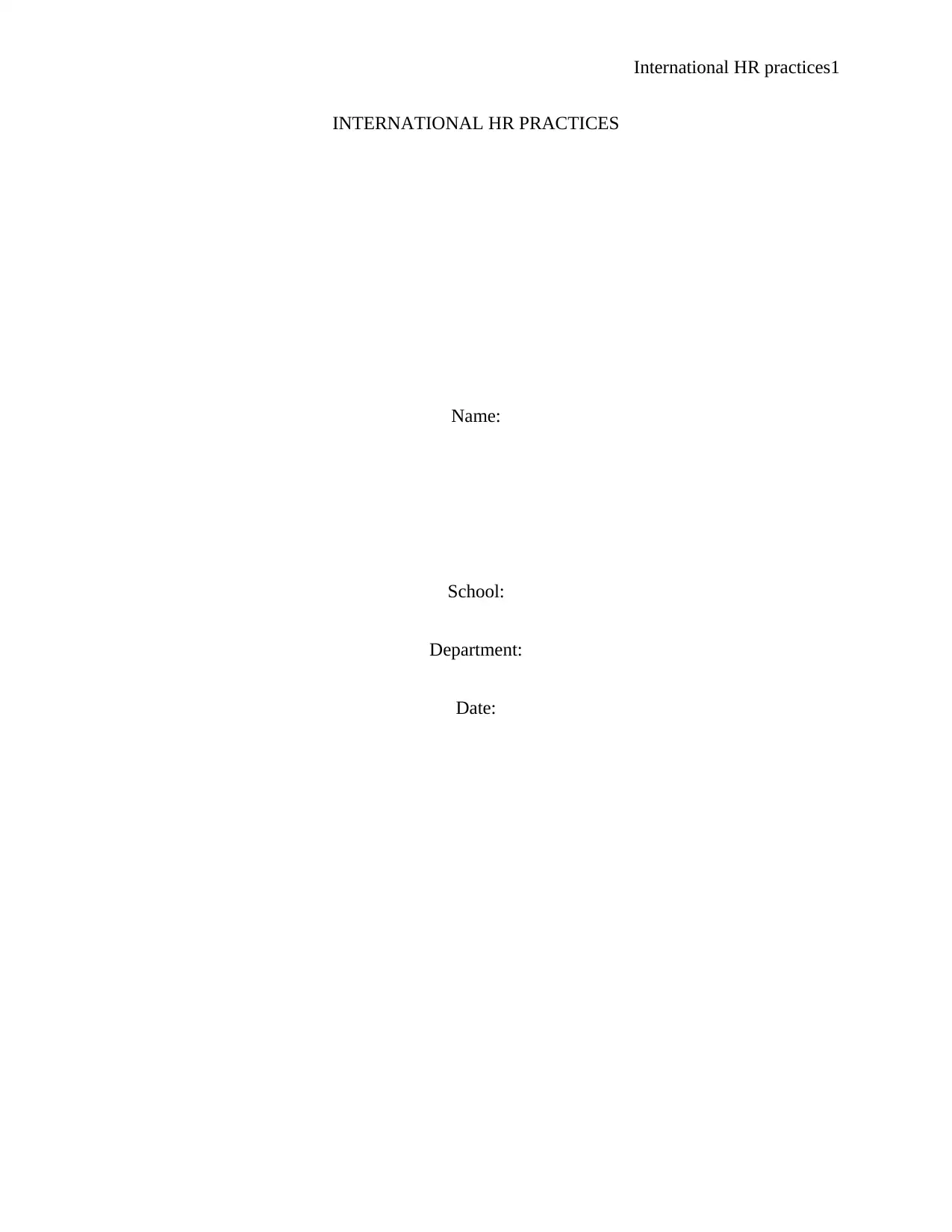
International HR practices1
INTERNATIONAL HR PRACTICES
Name:
School:
Department:
Date:
INTERNATIONAL HR PRACTICES
Name:
School:
Department:
Date:
Paraphrase This Document
Need a fresh take? Get an instant paraphrase of this document with our AI Paraphraser
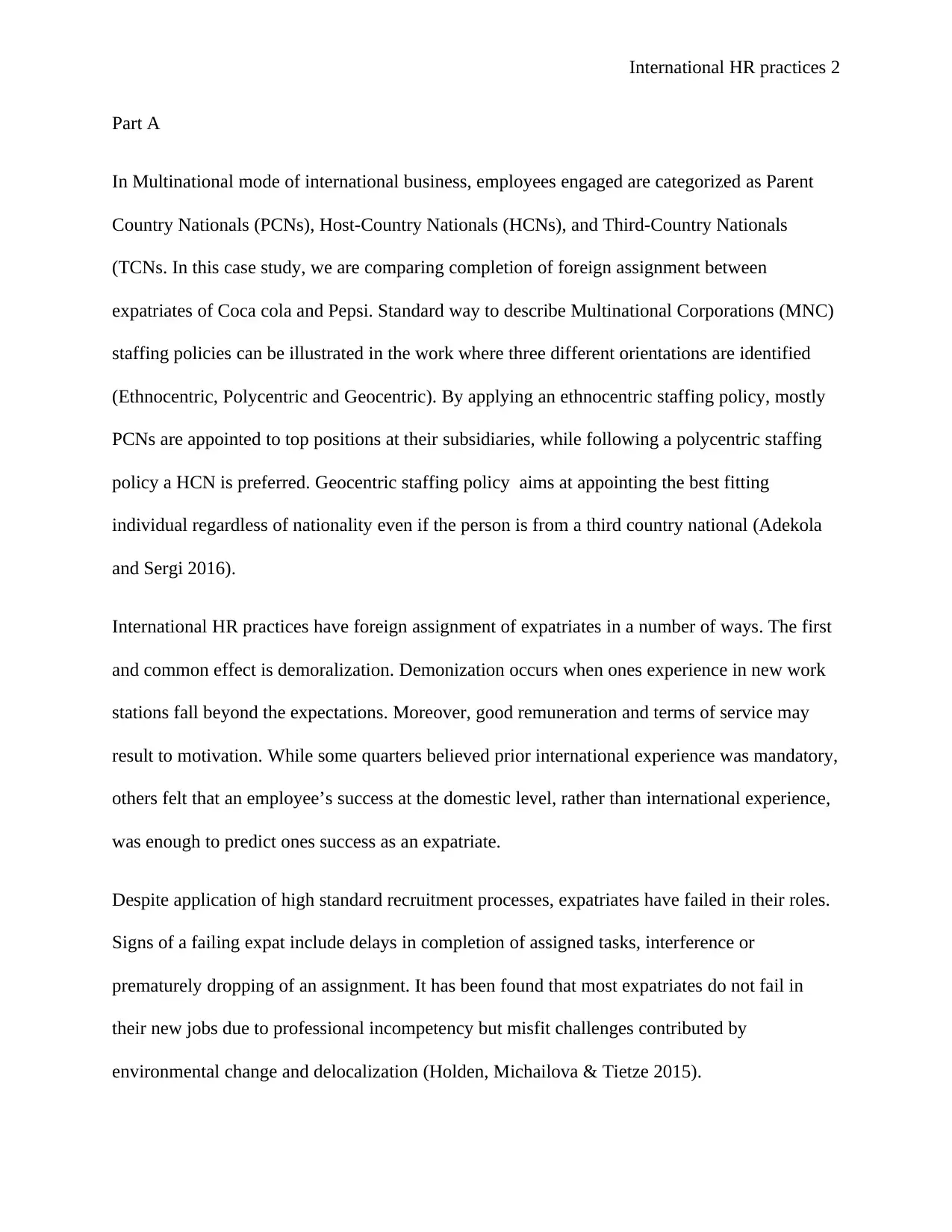
International HR practices 2
Part A
In Multinational mode of international business, employees engaged are categorized as Parent
Country Nationals (PCNs), Host-Country Nationals (HCNs), and Third-Country Nationals
(TCNs. In this case study, we are comparing completion of foreign assignment between
expatriates of Coca cola and Pepsi. Standard way to describe Multinational Corporations (MNC)
staffing policies can be illustrated in the work where three different orientations are identified
(Ethnocentric, Polycentric and Geocentric). By applying an ethnocentric staffing policy, mostly
PCNs are appointed to top positions at their subsidiaries, while following a polycentric staffing
policy a HCN is preferred. Geocentric staffing policy aims at appointing the best fitting
individual regardless of nationality even if the person is from a third country national (Adekola
and Sergi 2016).
International HR practices have foreign assignment of expatriates in a number of ways. The first
and common effect is demoralization. Demonization occurs when ones experience in new work
stations fall beyond the expectations. Moreover, good remuneration and terms of service may
result to motivation. While some quarters believed prior international experience was mandatory,
others felt that an employee’s success at the domestic level, rather than international experience,
was enough to predict ones success as an expatriate.
Despite application of high standard recruitment processes, expatriates have failed in their roles.
Signs of a failing expat include delays in completion of assigned tasks, interference or
prematurely dropping of an assignment. It has been found that most expatriates do not fail in
their new jobs due to professional incompetency but misfit challenges contributed by
environmental change and delocalization (Holden, Michailova & Tietze 2015).
Part A
In Multinational mode of international business, employees engaged are categorized as Parent
Country Nationals (PCNs), Host-Country Nationals (HCNs), and Third-Country Nationals
(TCNs. In this case study, we are comparing completion of foreign assignment between
expatriates of Coca cola and Pepsi. Standard way to describe Multinational Corporations (MNC)
staffing policies can be illustrated in the work where three different orientations are identified
(Ethnocentric, Polycentric and Geocentric). By applying an ethnocentric staffing policy, mostly
PCNs are appointed to top positions at their subsidiaries, while following a polycentric staffing
policy a HCN is preferred. Geocentric staffing policy aims at appointing the best fitting
individual regardless of nationality even if the person is from a third country national (Adekola
and Sergi 2016).
International HR practices have foreign assignment of expatriates in a number of ways. The first
and common effect is demoralization. Demonization occurs when ones experience in new work
stations fall beyond the expectations. Moreover, good remuneration and terms of service may
result to motivation. While some quarters believed prior international experience was mandatory,
others felt that an employee’s success at the domestic level, rather than international experience,
was enough to predict ones success as an expatriate.
Despite application of high standard recruitment processes, expatriates have failed in their roles.
Signs of a failing expat include delays in completion of assigned tasks, interference or
prematurely dropping of an assignment. It has been found that most expatriates do not fail in
their new jobs due to professional incompetency but misfit challenges contributed by
environmental change and delocalization (Holden, Michailova & Tietze 2015).
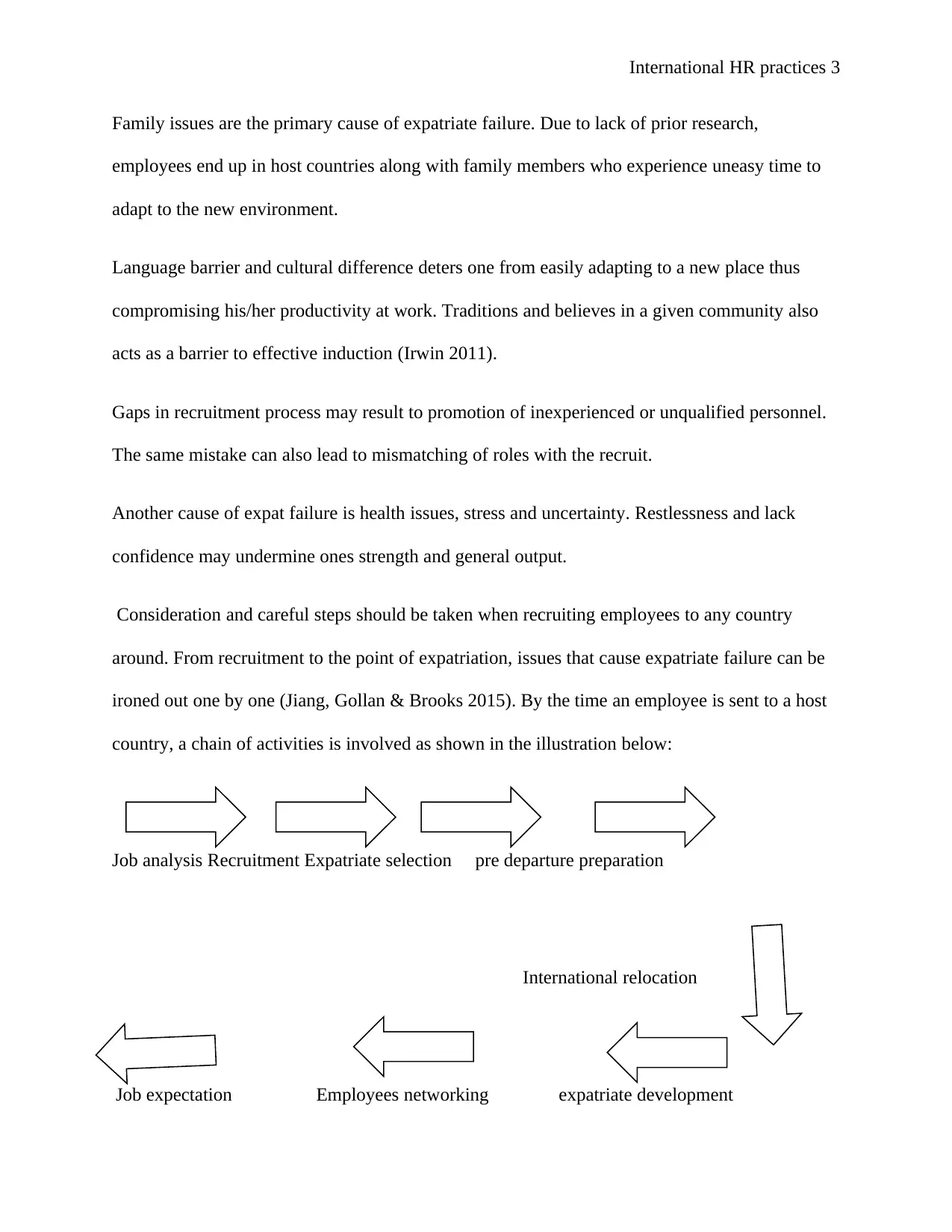
International HR practices 3
Family issues are the primary cause of expatriate failure. Due to lack of prior research,
employees end up in host countries along with family members who experience uneasy time to
adapt to the new environment.
Language barrier and cultural difference deters one from easily adapting to a new place thus
compromising his/her productivity at work. Traditions and believes in a given community also
acts as a barrier to effective induction (Irwin 2011).
Gaps in recruitment process may result to promotion of inexperienced or unqualified personnel.
The same mistake can also lead to mismatching of roles with the recruit.
Another cause of expat failure is health issues, stress and uncertainty. Restlessness and lack
confidence may undermine ones strength and general output.
Consideration and careful steps should be taken when recruiting employees to any country
around. From recruitment to the point of expatriation, issues that cause expatriate failure can be
ironed out one by one (Jiang, Gollan & Brooks 2015). By the time an employee is sent to a host
country, a chain of activities is involved as shown in the illustration below:
Job analysis Recruitment Expatriate selection pre departure preparation
International relocation
Job expectation Employees networking expatriate development
Family issues are the primary cause of expatriate failure. Due to lack of prior research,
employees end up in host countries along with family members who experience uneasy time to
adapt to the new environment.
Language barrier and cultural difference deters one from easily adapting to a new place thus
compromising his/her productivity at work. Traditions and believes in a given community also
acts as a barrier to effective induction (Irwin 2011).
Gaps in recruitment process may result to promotion of inexperienced or unqualified personnel.
The same mistake can also lead to mismatching of roles with the recruit.
Another cause of expat failure is health issues, stress and uncertainty. Restlessness and lack
confidence may undermine ones strength and general output.
Consideration and careful steps should be taken when recruiting employees to any country
around. From recruitment to the point of expatriation, issues that cause expatriate failure can be
ironed out one by one (Jiang, Gollan & Brooks 2015). By the time an employee is sent to a host
country, a chain of activities is involved as shown in the illustration below:
Job analysis Recruitment Expatriate selection pre departure preparation
International relocation
Job expectation Employees networking expatriate development
⊘ This is a preview!⊘
Do you want full access?
Subscribe today to unlock all pages.

Trusted by 1+ million students worldwide
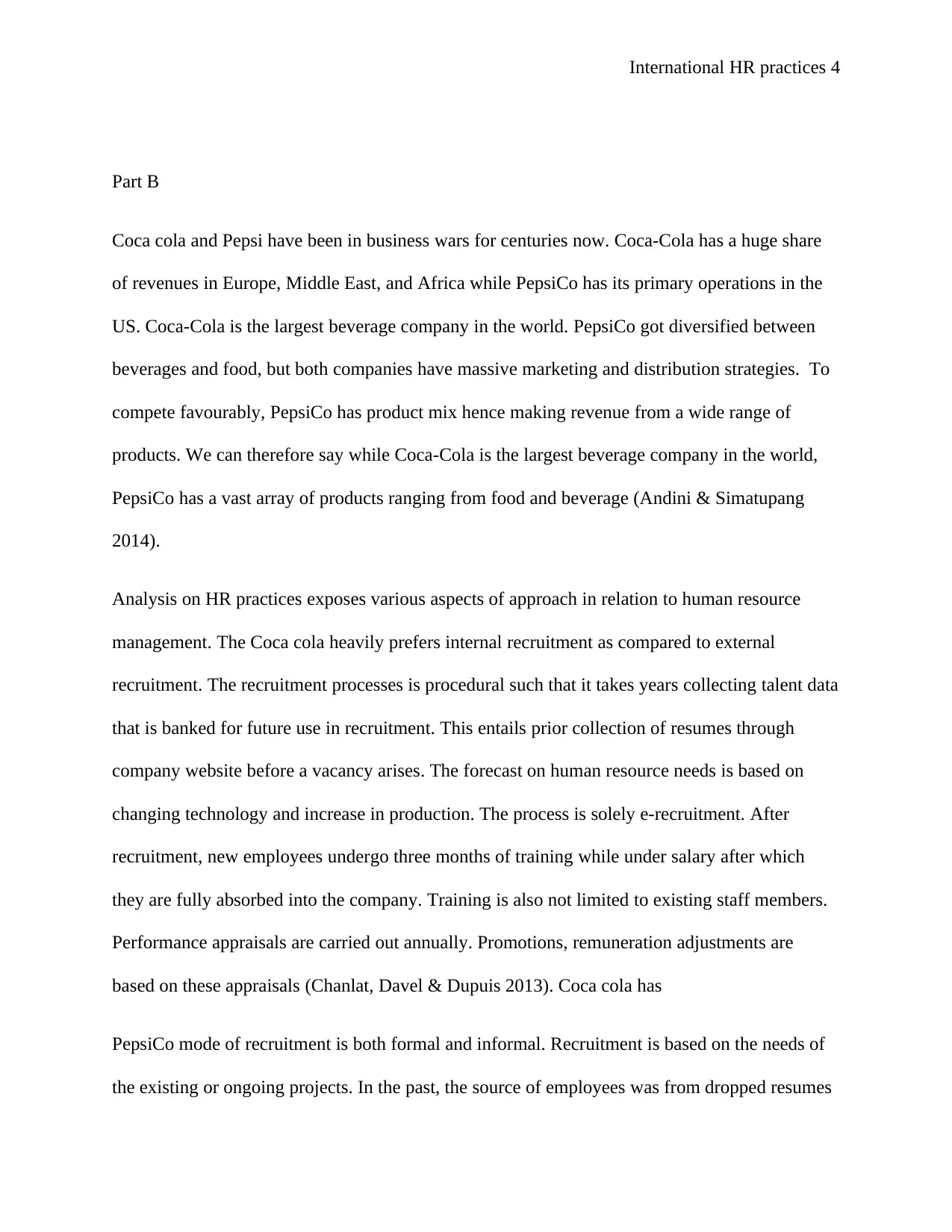
International HR practices 4
Part B
Coca cola and Pepsi have been in business wars for centuries now. Coca-Cola has a huge share
of revenues in Europe, Middle East, and Africa while PepsiCo has its primary operations in the
US. Coca-Cola is the largest beverage company in the world. PepsiCo got diversified between
beverages and food, but both companies have massive marketing and distribution strategies. To
compete favourably, PepsiCo has product mix hence making revenue from a wide range of
products. We can therefore say while Coca-Cola is the largest beverage company in the world,
PepsiCo has a vast array of products ranging from food and beverage (Andini & Simatupang
2014).
Analysis on HR practices exposes various aspects of approach in relation to human resource
management. The Coca cola heavily prefers internal recruitment as compared to external
recruitment. The recruitment processes is procedural such that it takes years collecting talent data
that is banked for future use in recruitment. This entails prior collection of resumes through
company website before a vacancy arises. The forecast on human resource needs is based on
changing technology and increase in production. The process is solely e-recruitment. After
recruitment, new employees undergo three months of training while under salary after which
they are fully absorbed into the company. Training is also not limited to existing staff members.
Performance appraisals are carried out annually. Promotions, remuneration adjustments are
based on these appraisals (Chanlat, Davel & Dupuis 2013). Coca cola has
PepsiCo mode of recruitment is both formal and informal. Recruitment is based on the needs of
the existing or ongoing projects. In the past, the source of employees was from dropped resumes
Part B
Coca cola and Pepsi have been in business wars for centuries now. Coca-Cola has a huge share
of revenues in Europe, Middle East, and Africa while PepsiCo has its primary operations in the
US. Coca-Cola is the largest beverage company in the world. PepsiCo got diversified between
beverages and food, but both companies have massive marketing and distribution strategies. To
compete favourably, PepsiCo has product mix hence making revenue from a wide range of
products. We can therefore say while Coca-Cola is the largest beverage company in the world,
PepsiCo has a vast array of products ranging from food and beverage (Andini & Simatupang
2014).
Analysis on HR practices exposes various aspects of approach in relation to human resource
management. The Coca cola heavily prefers internal recruitment as compared to external
recruitment. The recruitment processes is procedural such that it takes years collecting talent data
that is banked for future use in recruitment. This entails prior collection of resumes through
company website before a vacancy arises. The forecast on human resource needs is based on
changing technology and increase in production. The process is solely e-recruitment. After
recruitment, new employees undergo three months of training while under salary after which
they are fully absorbed into the company. Training is also not limited to existing staff members.
Performance appraisals are carried out annually. Promotions, remuneration adjustments are
based on these appraisals (Chanlat, Davel & Dupuis 2013). Coca cola has
PepsiCo mode of recruitment is both formal and informal. Recruitment is based on the needs of
the existing or ongoing projects. In the past, the source of employees was from dropped resumes
Paraphrase This Document
Need a fresh take? Get an instant paraphrase of this document with our AI Paraphraser
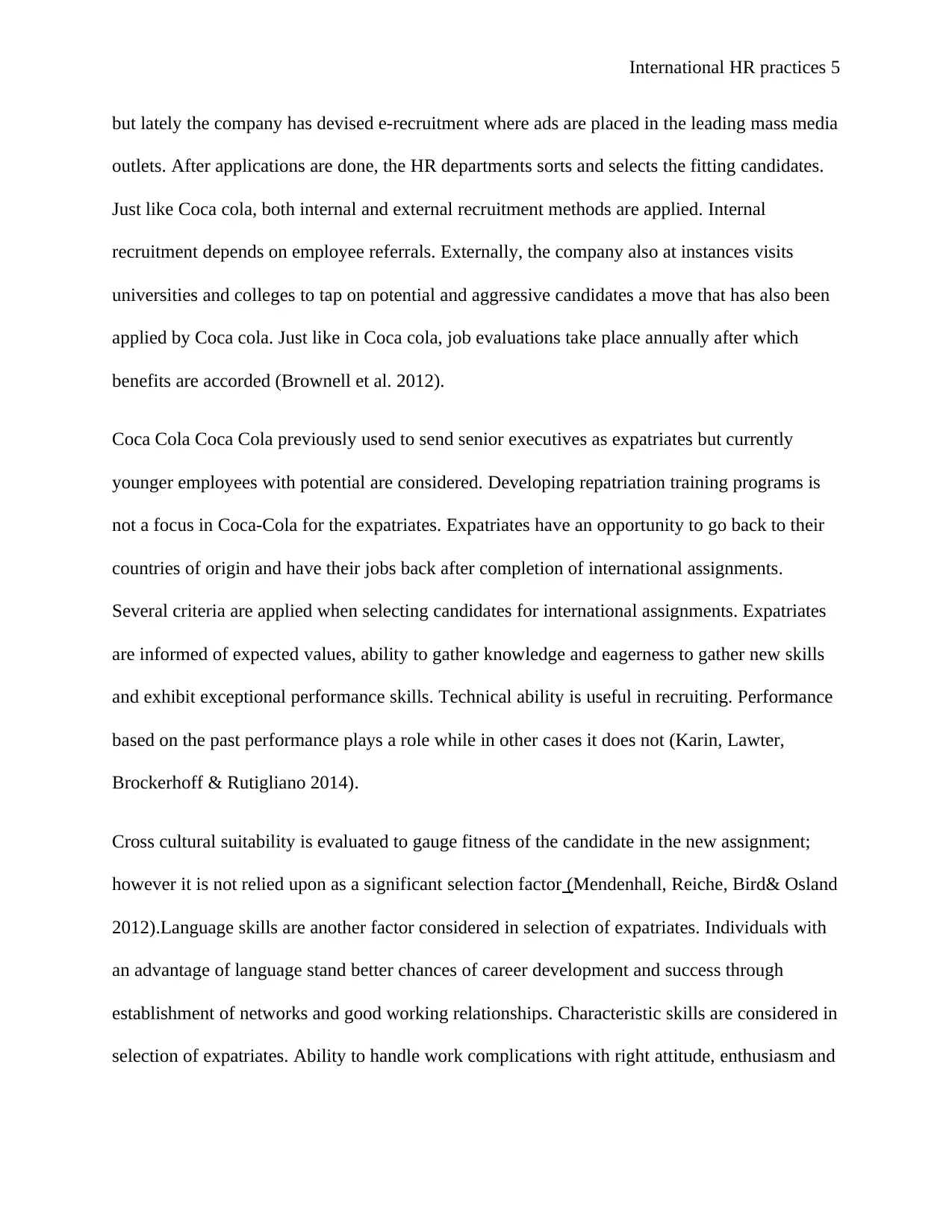
International HR practices 5
but lately the company has devised e-recruitment where ads are placed in the leading mass media
outlets. After applications are done, the HR departments sorts and selects the fitting candidates.
Just like Coca cola, both internal and external recruitment methods are applied. Internal
recruitment depends on employee referrals. Externally, the company also at instances visits
universities and colleges to tap on potential and aggressive candidates a move that has also been
applied by Coca cola. Just like in Coca cola, job evaluations take place annually after which
benefits are accorded (Brownell et al. 2012).
Coca Cola Coca Cola previously used to send senior executives as expatriates but currently
younger employees with potential are considered. Developing repatriation training programs is
not a focus in Coca-Cola for the expatriates. Expatriates have an opportunity to go back to their
countries of origin and have their jobs back after completion of international assignments.
Several criteria are applied when selecting candidates for international assignments. Expatriates
are informed of expected values, ability to gather knowledge and eagerness to gather new skills
and exhibit exceptional performance skills. Technical ability is useful in recruiting. Performance
based on the past performance plays a role while in other cases it does not (Karin, Lawter,
Brockerhoff & Rutigliano 2014).
Cross cultural suitability is evaluated to gauge fitness of the candidate in the new assignment;
however it is not relied upon as a significant selection factor (Mendenhall, Reiche, Bird& Osland
2012).Language skills are another factor considered in selection of expatriates. Individuals with
an advantage of language stand better chances of career development and success through
establishment of networks and good working relationships. Characteristic skills are considered in
selection of expatriates. Ability to handle work complications with right attitude, enthusiasm and
but lately the company has devised e-recruitment where ads are placed in the leading mass media
outlets. After applications are done, the HR departments sorts and selects the fitting candidates.
Just like Coca cola, both internal and external recruitment methods are applied. Internal
recruitment depends on employee referrals. Externally, the company also at instances visits
universities and colleges to tap on potential and aggressive candidates a move that has also been
applied by Coca cola. Just like in Coca cola, job evaluations take place annually after which
benefits are accorded (Brownell et al. 2012).
Coca Cola Coca Cola previously used to send senior executives as expatriates but currently
younger employees with potential are considered. Developing repatriation training programs is
not a focus in Coca-Cola for the expatriates. Expatriates have an opportunity to go back to their
countries of origin and have their jobs back after completion of international assignments.
Several criteria are applied when selecting candidates for international assignments. Expatriates
are informed of expected values, ability to gather knowledge and eagerness to gather new skills
and exhibit exceptional performance skills. Technical ability is useful in recruiting. Performance
based on the past performance plays a role while in other cases it does not (Karin, Lawter,
Brockerhoff & Rutigliano 2014).
Cross cultural suitability is evaluated to gauge fitness of the candidate in the new assignment;
however it is not relied upon as a significant selection factor (Mendenhall, Reiche, Bird& Osland
2012).Language skills are another factor considered in selection of expatriates. Individuals with
an advantage of language stand better chances of career development and success through
establishment of networks and good working relationships. Characteristic skills are considered in
selection of expatriates. Ability to handle work complications with right attitude, enthusiasm and
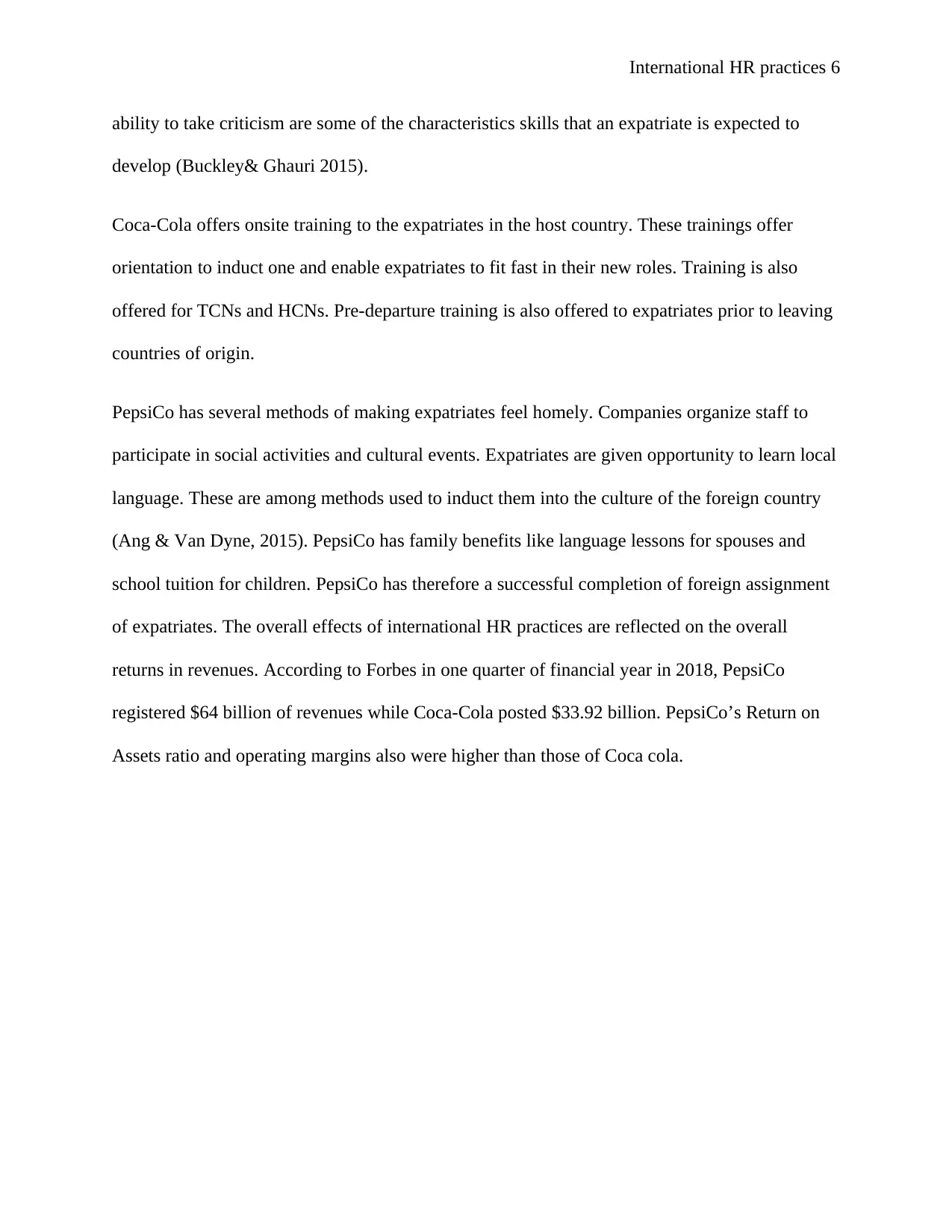
International HR practices 6
ability to take criticism are some of the characteristics skills that an expatriate is expected to
develop (Buckley& Ghauri 2015).
Coca-Cola offers onsite training to the expatriates in the host country. These trainings offer
orientation to induct one and enable expatriates to fit fast in their new roles. Training is also
offered for TCNs and HCNs. Pre-departure training is also offered to expatriates prior to leaving
countries of origin.
PepsiCo has several methods of making expatriates feel homely. Companies organize staff to
participate in social activities and cultural events. Expatriates are given opportunity to learn local
language. These are among methods used to induct them into the culture of the foreign country
(Ang & Van Dyne, 2015). PepsiCo has family benefits like language lessons for spouses and
school tuition for children. PepsiCo has therefore a successful completion of foreign assignment
of expatriates. The overall effects of international HR practices are reflected on the overall
returns in revenues. According to Forbes in one quarter of financial year in 2018, PepsiCo
registered $64 billion of revenues while Coca-Cola posted $33.92 billion. PepsiCo’s Return on
Assets ratio and operating margins also were higher than those of Coca cola.
ability to take criticism are some of the characteristics skills that an expatriate is expected to
develop (Buckley& Ghauri 2015).
Coca-Cola offers onsite training to the expatriates in the host country. These trainings offer
orientation to induct one and enable expatriates to fit fast in their new roles. Training is also
offered for TCNs and HCNs. Pre-departure training is also offered to expatriates prior to leaving
countries of origin.
PepsiCo has several methods of making expatriates feel homely. Companies organize staff to
participate in social activities and cultural events. Expatriates are given opportunity to learn local
language. These are among methods used to induct them into the culture of the foreign country
(Ang & Van Dyne, 2015). PepsiCo has family benefits like language lessons for spouses and
school tuition for children. PepsiCo has therefore a successful completion of foreign assignment
of expatriates. The overall effects of international HR practices are reflected on the overall
returns in revenues. According to Forbes in one quarter of financial year in 2018, PepsiCo
registered $64 billion of revenues while Coca-Cola posted $33.92 billion. PepsiCo’s Return on
Assets ratio and operating margins also were higher than those of Coca cola.
⊘ This is a preview!⊘
Do you want full access?
Subscribe today to unlock all pages.

Trusted by 1+ million students worldwide
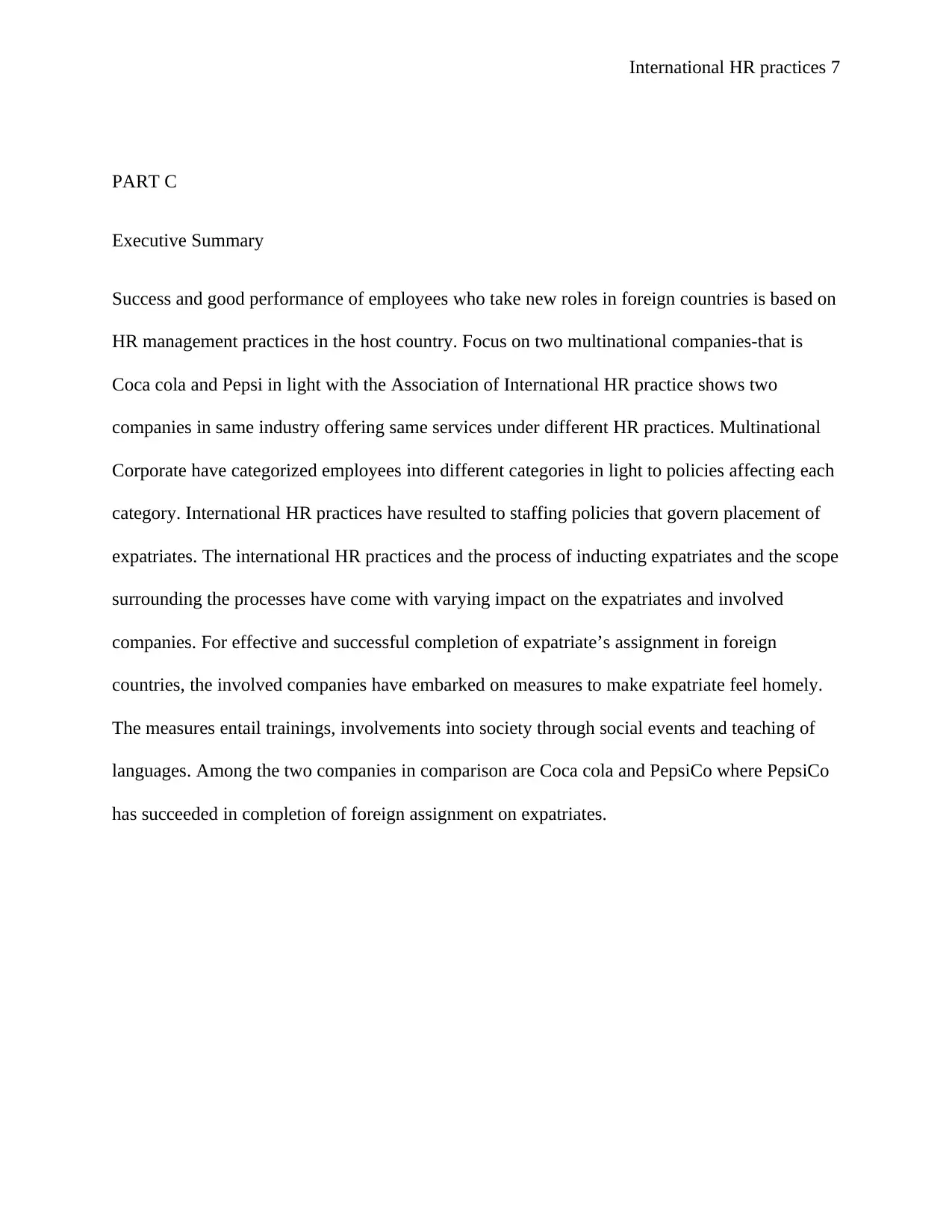
International HR practices 7
PART C
Executive Summary
Success and good performance of employees who take new roles in foreign countries is based on
HR management practices in the host country. Focus on two multinational companies-that is
Coca cola and Pepsi in light with the Association of International HR practice shows two
companies in same industry offering same services under different HR practices. Multinational
Corporate have categorized employees into different categories in light to policies affecting each
category. International HR practices have resulted to staffing policies that govern placement of
expatriates. The international HR practices and the process of inducting expatriates and the scope
surrounding the processes have come with varying impact on the expatriates and involved
companies. For effective and successful completion of expatriate’s assignment in foreign
countries, the involved companies have embarked on measures to make expatriate feel homely.
The measures entail trainings, involvements into society through social events and teaching of
languages. Among the two companies in comparison are Coca cola and PepsiCo where PepsiCo
has succeeded in completion of foreign assignment on expatriates.
PART C
Executive Summary
Success and good performance of employees who take new roles in foreign countries is based on
HR management practices in the host country. Focus on two multinational companies-that is
Coca cola and Pepsi in light with the Association of International HR practice shows two
companies in same industry offering same services under different HR practices. Multinational
Corporate have categorized employees into different categories in light to policies affecting each
category. International HR practices have resulted to staffing policies that govern placement of
expatriates. The international HR practices and the process of inducting expatriates and the scope
surrounding the processes have come with varying impact on the expatriates and involved
companies. For effective and successful completion of expatriate’s assignment in foreign
countries, the involved companies have embarked on measures to make expatriate feel homely.
The measures entail trainings, involvements into society through social events and teaching of
languages. Among the two companies in comparison are Coca cola and PepsiCo where PepsiCo
has succeeded in completion of foreign assignment on expatriates.
Paraphrase This Document
Need a fresh take? Get an instant paraphrase of this document with our AI Paraphraser
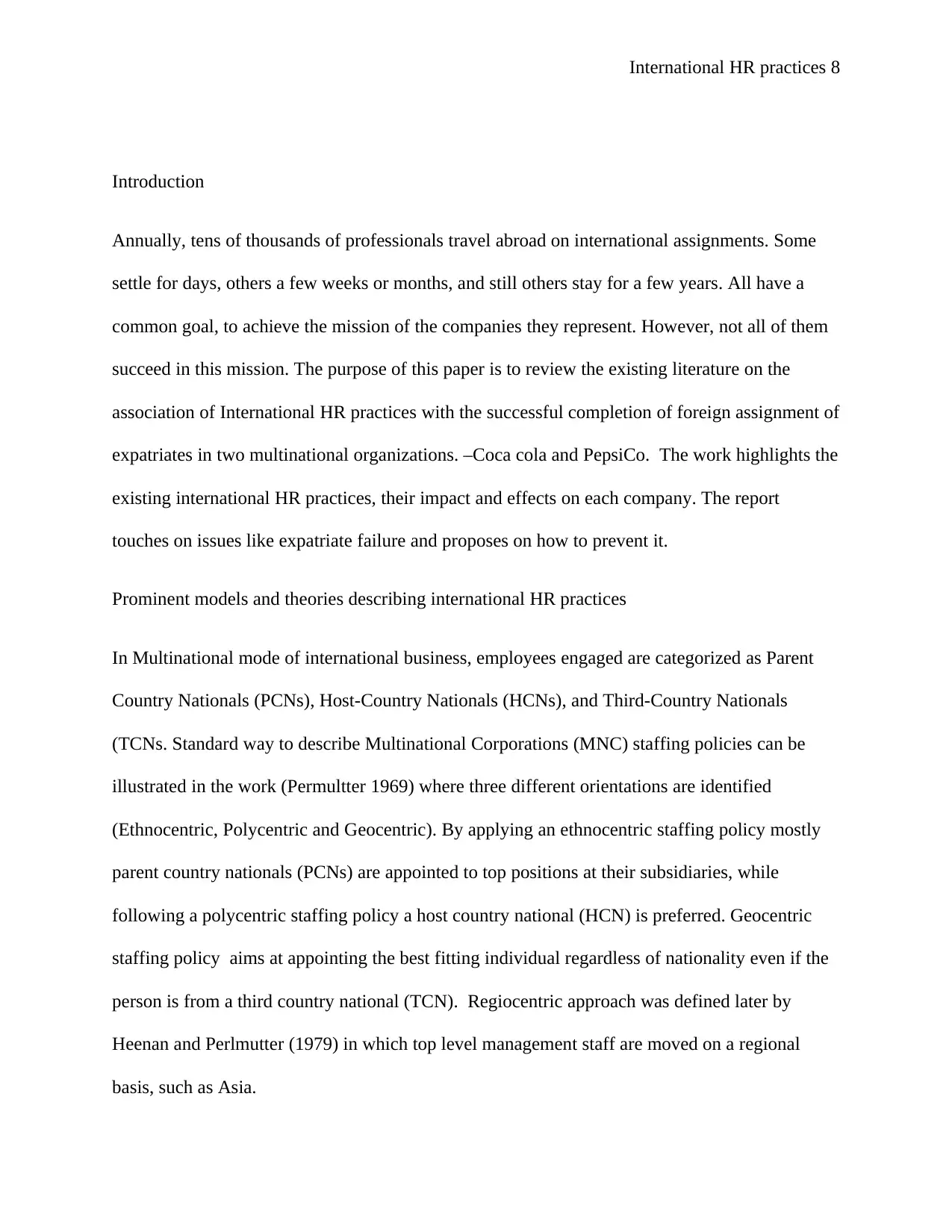
International HR practices 8
Introduction
Annually, tens of thousands of professionals travel abroad on international assignments. Some
settle for days, others a few weeks or months, and still others stay for a few years. All have a
common goal, to achieve the mission of the companies they represent. However, not all of them
succeed in this mission. The purpose of this paper is to review the existing literature on the
association of International HR practices with the successful completion of foreign assignment of
expatriates in two multinational organizations. –Coca cola and PepsiCo. The work highlights the
existing international HR practices, their impact and effects on each company. The report
touches on issues like expatriate failure and proposes on how to prevent it.
Prominent models and theories describing international HR practices
In Multinational mode of international business, employees engaged are categorized as Parent
Country Nationals (PCNs), Host-Country Nationals (HCNs), and Third-Country Nationals
(TCNs. Standard way to describe Multinational Corporations (MNC) staffing policies can be
illustrated in the work (Permultter 1969) where three different orientations are identified
(Ethnocentric, Polycentric and Geocentric). By applying an ethnocentric staffing policy mostly
parent country nationals (PCNs) are appointed to top positions at their subsidiaries, while
following a polycentric staffing policy a host country national (HCN) is preferred. Geocentric
staffing policy aims at appointing the best fitting individual regardless of nationality even if the
person is from a third country national (TCN). Regiocentric approach was defined later by
Heenan and Perlmutter (1979) in which top level management staff are moved on a regional
basis, such as Asia.
Introduction
Annually, tens of thousands of professionals travel abroad on international assignments. Some
settle for days, others a few weeks or months, and still others stay for a few years. All have a
common goal, to achieve the mission of the companies they represent. However, not all of them
succeed in this mission. The purpose of this paper is to review the existing literature on the
association of International HR practices with the successful completion of foreign assignment of
expatriates in two multinational organizations. –Coca cola and PepsiCo. The work highlights the
existing international HR practices, their impact and effects on each company. The report
touches on issues like expatriate failure and proposes on how to prevent it.
Prominent models and theories describing international HR practices
In Multinational mode of international business, employees engaged are categorized as Parent
Country Nationals (PCNs), Host-Country Nationals (HCNs), and Third-Country Nationals
(TCNs. Standard way to describe Multinational Corporations (MNC) staffing policies can be
illustrated in the work (Permultter 1969) where three different orientations are identified
(Ethnocentric, Polycentric and Geocentric). By applying an ethnocentric staffing policy mostly
parent country nationals (PCNs) are appointed to top positions at their subsidiaries, while
following a polycentric staffing policy a host country national (HCN) is preferred. Geocentric
staffing policy aims at appointing the best fitting individual regardless of nationality even if the
person is from a third country national (TCN). Regiocentric approach was defined later by
Heenan and Perlmutter (1979) in which top level management staff are moved on a regional
basis, such as Asia.
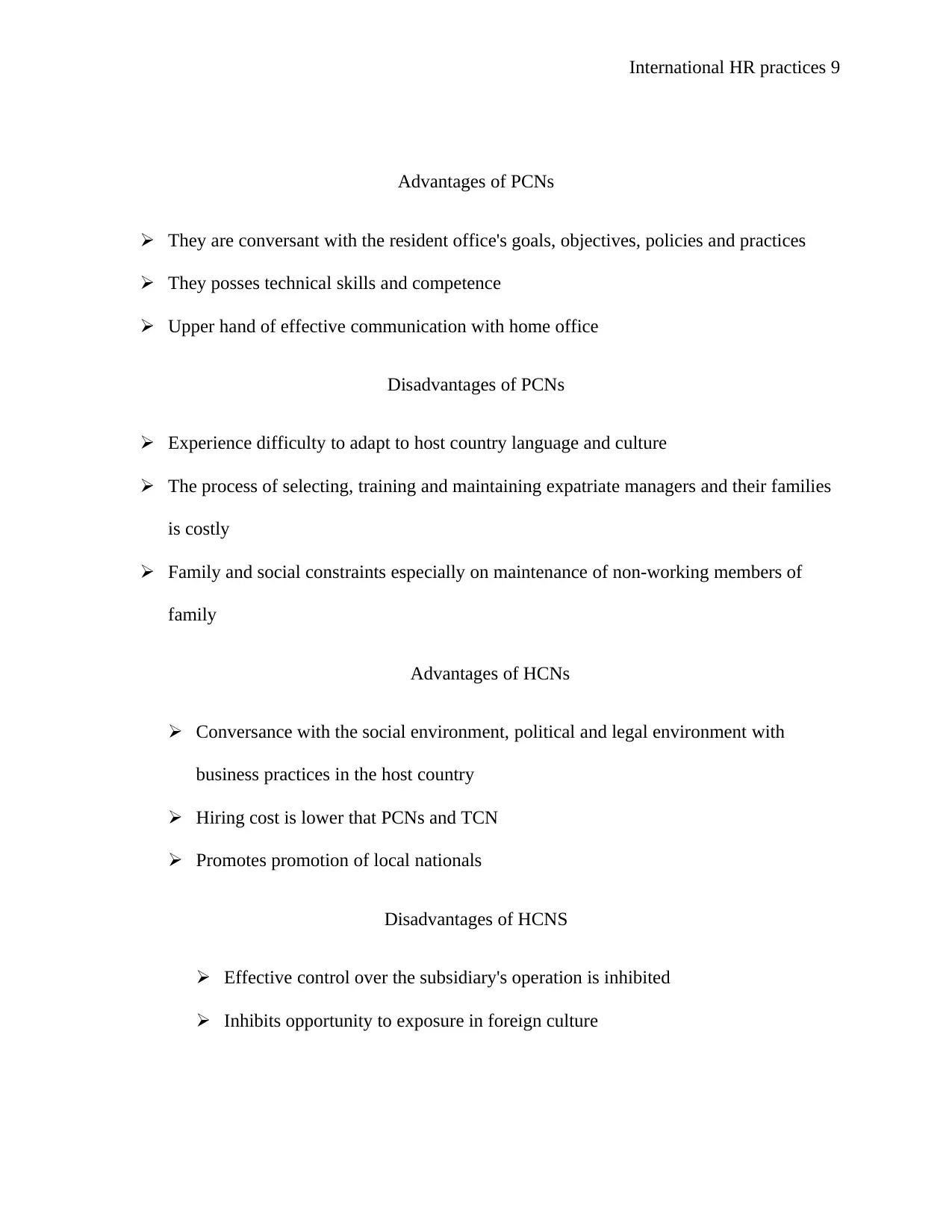
International HR practices 9
Advantages of PCNs
They are conversant with the resident office's goals, objectives, policies and practices
They posses technical skills and competence
Upper hand of effective communication with home office
Disadvantages of PCNs
Experience difficulty to adapt to host country language and culture
The process of selecting, training and maintaining expatriate managers and their families
is costly
Family and social constraints especially on maintenance of non-working members of
family
Advantages of HCNs
Conversance with the social environment, political and legal environment with
business practices in the host country
Hiring cost is lower that PCNs and TCN
Promotes promotion of local nationals
Disadvantages of HCNS
Effective control over the subsidiary's operation is inhibited
Inhibits opportunity to exposure in foreign culture
Advantages of PCNs
They are conversant with the resident office's goals, objectives, policies and practices
They posses technical skills and competence
Upper hand of effective communication with home office
Disadvantages of PCNs
Experience difficulty to adapt to host country language and culture
The process of selecting, training and maintaining expatriate managers and their families
is costly
Family and social constraints especially on maintenance of non-working members of
family
Advantages of HCNs
Conversance with the social environment, political and legal environment with
business practices in the host country
Hiring cost is lower that PCNs and TCN
Promotes promotion of local nationals
Disadvantages of HCNS
Effective control over the subsidiary's operation is inhibited
Inhibits opportunity to exposure in foreign culture
⊘ This is a preview!⊘
Do you want full access?
Subscribe today to unlock all pages.

Trusted by 1+ million students worldwide
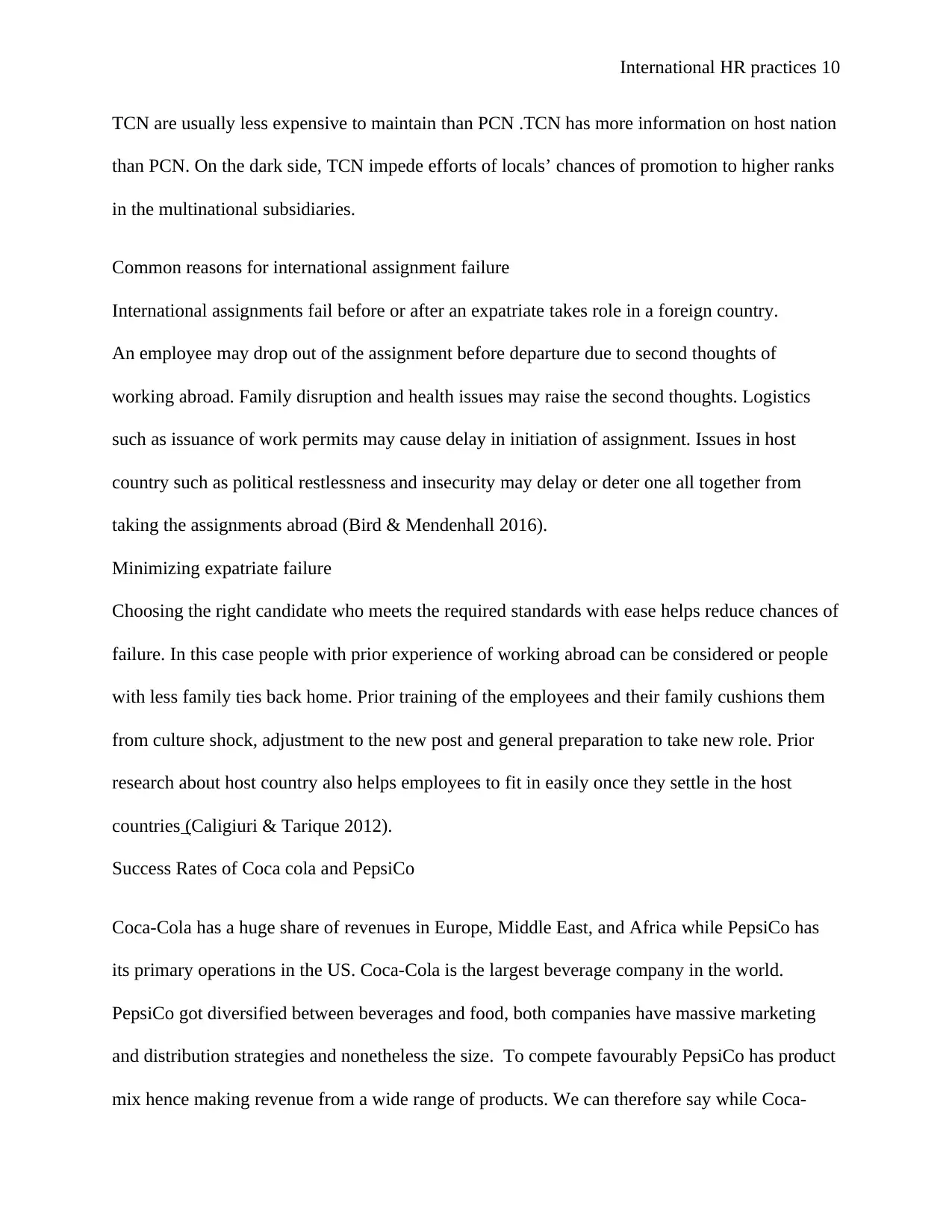
International HR practices 10
TCN are usually less expensive to maintain than PCN .TCN has more information on host nation
than PCN. On the dark side, TCN impede efforts of locals’ chances of promotion to higher ranks
in the multinational subsidiaries.
Common reasons for international assignment failure
International assignments fail before or after an expatriate takes role in a foreign country.
An employee may drop out of the assignment before departure due to second thoughts of
working abroad. Family disruption and health issues may raise the second thoughts. Logistics
such as issuance of work permits may cause delay in initiation of assignment. Issues in host
country such as political restlessness and insecurity may delay or deter one all together from
taking the assignments abroad (Bird & Mendenhall 2016).
Minimizing expatriate failure
Choosing the right candidate who meets the required standards with ease helps reduce chances of
failure. In this case people with prior experience of working abroad can be considered or people
with less family ties back home. Prior training of the employees and their family cushions them
from culture shock, adjustment to the new post and general preparation to take new role. Prior
research about host country also helps employees to fit in easily once they settle in the host
countries (Caligiuri & Tarique 2012).
Success Rates of Coca cola and PepsiCo
Coca-Cola has a huge share of revenues in Europe, Middle East, and Africa while PepsiCo has
its primary operations in the US. Coca-Cola is the largest beverage company in the world.
PepsiCo got diversified between beverages and food, both companies have massive marketing
and distribution strategies and nonetheless the size. To compete favourably PepsiCo has product
mix hence making revenue from a wide range of products. We can therefore say while Coca-
TCN are usually less expensive to maintain than PCN .TCN has more information on host nation
than PCN. On the dark side, TCN impede efforts of locals’ chances of promotion to higher ranks
in the multinational subsidiaries.
Common reasons for international assignment failure
International assignments fail before or after an expatriate takes role in a foreign country.
An employee may drop out of the assignment before departure due to second thoughts of
working abroad. Family disruption and health issues may raise the second thoughts. Logistics
such as issuance of work permits may cause delay in initiation of assignment. Issues in host
country such as political restlessness and insecurity may delay or deter one all together from
taking the assignments abroad (Bird & Mendenhall 2016).
Minimizing expatriate failure
Choosing the right candidate who meets the required standards with ease helps reduce chances of
failure. In this case people with prior experience of working abroad can be considered or people
with less family ties back home. Prior training of the employees and their family cushions them
from culture shock, adjustment to the new post and general preparation to take new role. Prior
research about host country also helps employees to fit in easily once they settle in the host
countries (Caligiuri & Tarique 2012).
Success Rates of Coca cola and PepsiCo
Coca-Cola has a huge share of revenues in Europe, Middle East, and Africa while PepsiCo has
its primary operations in the US. Coca-Cola is the largest beverage company in the world.
PepsiCo got diversified between beverages and food, both companies have massive marketing
and distribution strategies and nonetheless the size. To compete favourably PepsiCo has product
mix hence making revenue from a wide range of products. We can therefore say while Coca-
Paraphrase This Document
Need a fresh take? Get an instant paraphrase of this document with our AI Paraphraser
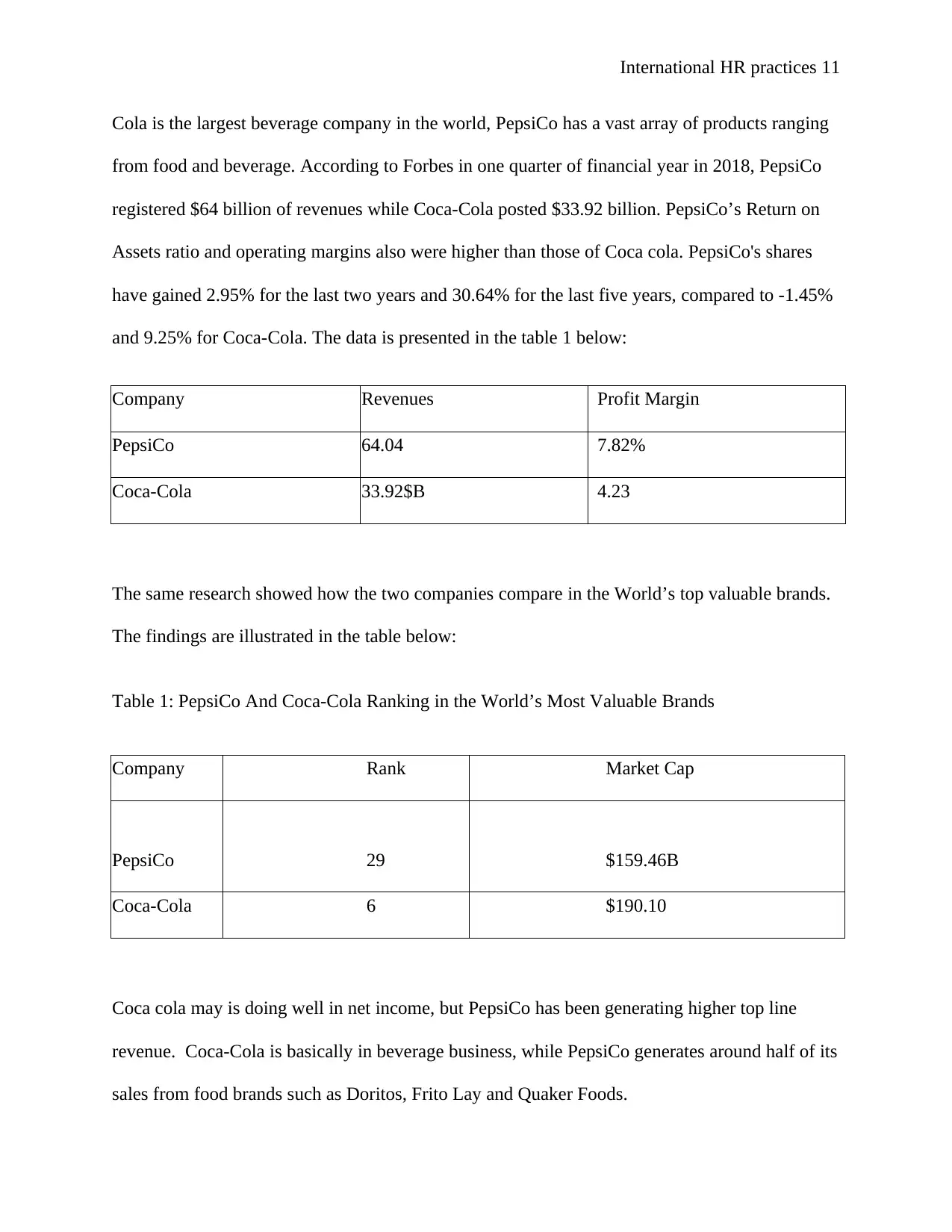
International HR practices 11
Cola is the largest beverage company in the world, PepsiCo has a vast array of products ranging
from food and beverage. According to Forbes in one quarter of financial year in 2018, PepsiCo
registered $64 billion of revenues while Coca-Cola posted $33.92 billion. PepsiCo’s Return on
Assets ratio and operating margins also were higher than those of Coca cola. PepsiCo's shares
have gained 2.95% for the last two years and 30.64% for the last five years, compared to -1.45%
and 9.25% for Coca-Cola. The data is presented in the table 1 below:
Company Revenues Profit Margin
PepsiCo 64.04 7.82%
Coca-Cola 33.92$B 4.23
The same research showed how the two companies compare in the World’s top valuable brands.
The findings are illustrated in the table below:
Table 1: PepsiCo And Coca-Cola Ranking in the World’s Most Valuable Brands
Company Rank Market Cap
PepsiCo 29 $159.46B
Coca-Cola 6 $190.10
Coca cola may is doing well in net income, but PepsiCo has been generating higher top line
revenue. Coca-Cola is basically in beverage business, while PepsiCo generates around half of its
sales from food brands such as Doritos, Frito Lay and Quaker Foods.
Cola is the largest beverage company in the world, PepsiCo has a vast array of products ranging
from food and beverage. According to Forbes in one quarter of financial year in 2018, PepsiCo
registered $64 billion of revenues while Coca-Cola posted $33.92 billion. PepsiCo’s Return on
Assets ratio and operating margins also were higher than those of Coca cola. PepsiCo's shares
have gained 2.95% for the last two years and 30.64% for the last five years, compared to -1.45%
and 9.25% for Coca-Cola. The data is presented in the table 1 below:
Company Revenues Profit Margin
PepsiCo 64.04 7.82%
Coca-Cola 33.92$B 4.23
The same research showed how the two companies compare in the World’s top valuable brands.
The findings are illustrated in the table below:
Table 1: PepsiCo And Coca-Cola Ranking in the World’s Most Valuable Brands
Company Rank Market Cap
PepsiCo 29 $159.46B
Coca-Cola 6 $190.10
Coca cola may is doing well in net income, but PepsiCo has been generating higher top line
revenue. Coca-Cola is basically in beverage business, while PepsiCo generates around half of its
sales from food brands such as Doritos, Frito Lay and Quaker Foods.
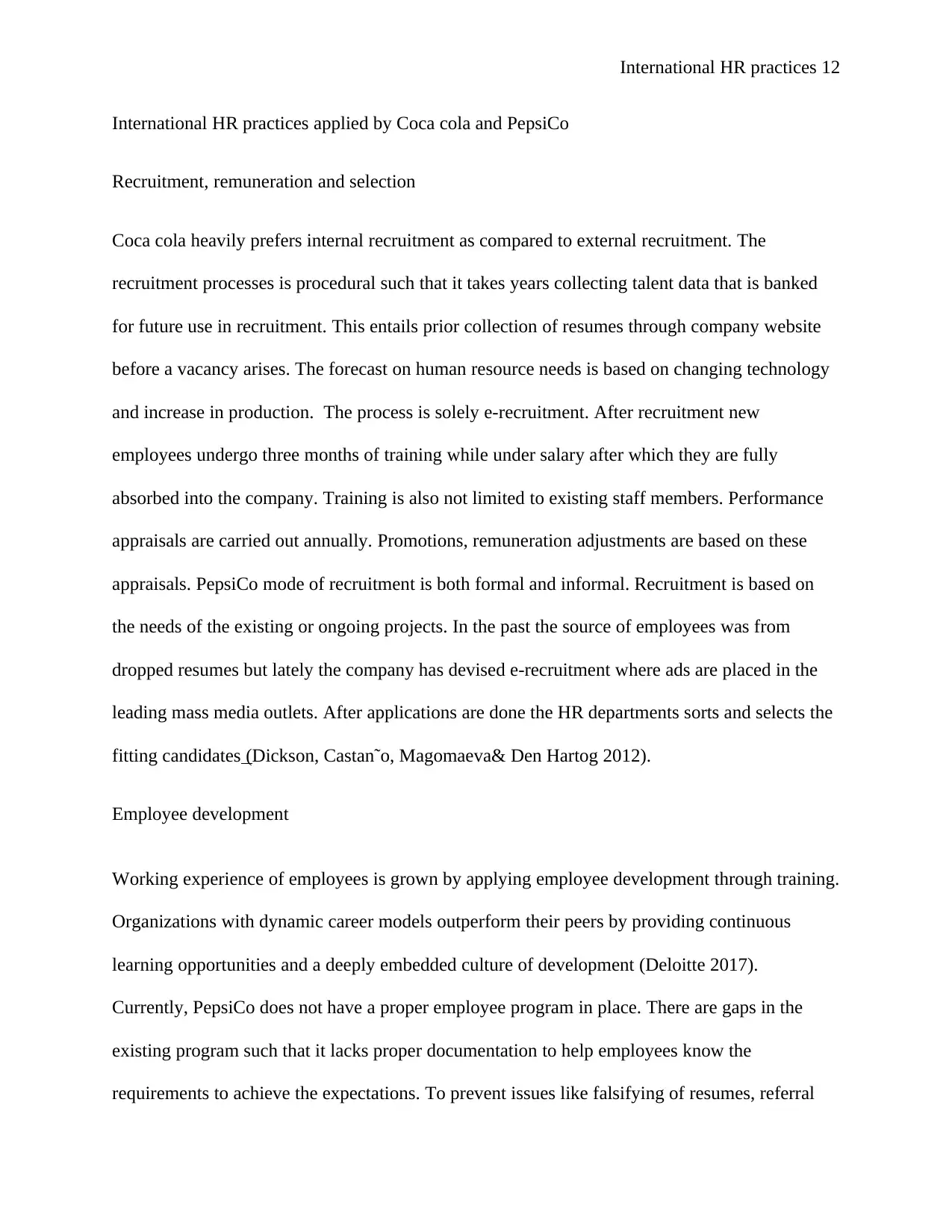
International HR practices 12
International HR practices applied by Coca cola and PepsiCo
Recruitment, remuneration and selection
Coca cola heavily prefers internal recruitment as compared to external recruitment. The
recruitment processes is procedural such that it takes years collecting talent data that is banked
for future use in recruitment. This entails prior collection of resumes through company website
before a vacancy arises. The forecast on human resource needs is based on changing technology
and increase in production. The process is solely e-recruitment. After recruitment new
employees undergo three months of training while under salary after which they are fully
absorbed into the company. Training is also not limited to existing staff members. Performance
appraisals are carried out annually. Promotions, remuneration adjustments are based on these
appraisals. PepsiCo mode of recruitment is both formal and informal. Recruitment is based on
the needs of the existing or ongoing projects. In the past the source of employees was from
dropped resumes but lately the company has devised e-recruitment where ads are placed in the
leading mass media outlets. After applications are done the HR departments sorts and selects the
fitting candidates (Dickson, Castan˜o, Magomaeva& Den Hartog 2012).
Employee development
Working experience of employees is grown by applying employee development through training.
Organizations with dynamic career models outperform their peers by providing continuous
learning opportunities and a deeply embedded culture of development (Deloitte 2017).
Currently, PepsiCo does not have a proper employee program in place. There are gaps in the
existing program such that it lacks proper documentation to help employees know the
requirements to achieve the expectations. To prevent issues like falsifying of resumes, referral
International HR practices applied by Coca cola and PepsiCo
Recruitment, remuneration and selection
Coca cola heavily prefers internal recruitment as compared to external recruitment. The
recruitment processes is procedural such that it takes years collecting talent data that is banked
for future use in recruitment. This entails prior collection of resumes through company website
before a vacancy arises. The forecast on human resource needs is based on changing technology
and increase in production. The process is solely e-recruitment. After recruitment new
employees undergo three months of training while under salary after which they are fully
absorbed into the company. Training is also not limited to existing staff members. Performance
appraisals are carried out annually. Promotions, remuneration adjustments are based on these
appraisals. PepsiCo mode of recruitment is both formal and informal. Recruitment is based on
the needs of the existing or ongoing projects. In the past the source of employees was from
dropped resumes but lately the company has devised e-recruitment where ads are placed in the
leading mass media outlets. After applications are done the HR departments sorts and selects the
fitting candidates (Dickson, Castan˜o, Magomaeva& Den Hartog 2012).
Employee development
Working experience of employees is grown by applying employee development through training.
Organizations with dynamic career models outperform their peers by providing continuous
learning opportunities and a deeply embedded culture of development (Deloitte 2017).
Currently, PepsiCo does not have a proper employee program in place. There are gaps in the
existing program such that it lacks proper documentation to help employees know the
requirements to achieve the expectations. To prevent issues like falsifying of resumes, referral
⊘ This is a preview!⊘
Do you want full access?
Subscribe today to unlock all pages.

Trusted by 1+ million students worldwide
1 out of 19
Related Documents
Your All-in-One AI-Powered Toolkit for Academic Success.
+13062052269
info@desklib.com
Available 24*7 on WhatsApp / Email
![[object Object]](/_next/static/media/star-bottom.7253800d.svg)
Unlock your academic potential
Copyright © 2020–2025 A2Z Services. All Rights Reserved. Developed and managed by ZUCOL.





